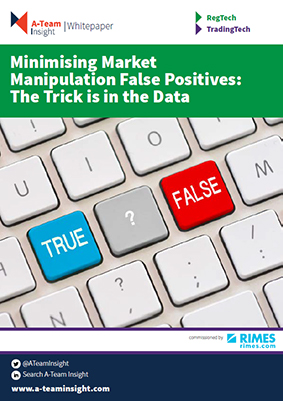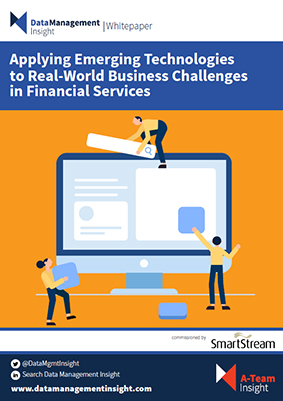A-Team Insight White Paper
Alternative Data: Application and Best Practices for Investment Management Firms
Listen to the related webinar here. Knowledge is money in capital markets and alternative data is fast becoming part of that knowledge, but it is not always easy to source, evaluate, integrate and use to best effect. The data may be incomplete, unstructured, include data that isn’t permitted for redistribution under privacy laws, and have...
Solving the KYC & AML Challenge for Cryptocurrencies, Tokens & ICOs
The cryptocurrency market is at an inflection point. It has gained substantial momentum from early investors (private & retail), day traders and prop shops but it has so far failed to get substantive engagement from wider institutional players. The crypto marketplace today is a mix of exchange and OTC-traded activity with little of the market...
Getting eComms Surveillance Right
Demand for electronic communications (eComms) surveillance has risen in response to regulatory requirements and compliance needs to pinpoint problems such as market abuse without wasting time and resources reviewing false positives. Innovative technologies such as machine learning, natural language understanding (NLU) and other strands of artificial intelligence (AI) are improving financial services firms’ ability to...
Quantity vs. Quality: An Evolving Research Paradigm
A revolution is under way in how buy-side firms conceptualize value in the research they consume. However, sell-side houses may be behind the curve in recognizing this. Driving this change in perception among buy-side firms is the EU’s Markets in Financial Instruments Directive II (MiFID II). Under MiFID II, buy-side firms have to pay for...
The Signal and the Noise: Changing the Approach to Investment Data
Today there is significant pressure on active management funds to generate returns that are better than the passive funds that they compete against. As a result, investment managers are constantly seeking new ways to generate investment edge. This has happened in an environment where the volume and velocity of investment data available continues to accelerate....
Adding Context to Alternative Data
The investment management community’s embrace of alternative data has created a tsunami of new data sets that are packaged by specialists to offer unique insight into very specific industry segments and business activities. But as valuable as this data is, it has its limitations: alternative data can tell us what’s happening now, based on recent...
Minimising Market Manipulation False Positives: The Trick is in the Data
The focus on market manipulation has probably never been higher. In the wake of the Financial Crisis of 2008, with its multiple market manipulation scandals, regulators have ratcheted up compliance requirements for firms. The media has also sharpened its focus – the cost of a controls failure in this area can be catastrophic in terms...
How Banks and New Venues Can Create a Future-Proofed Data Business
A 7-Step Process for Banks and New Venues to Create a Future-Proofed Data Business If you are a bank or a new trading venue, you may be aware that there is significant value in the market data that is generated by your business activities. But you may not know how best to monetise that data...
Applying Emerging Technologies to Real-World Business Challenge in Financial Services
Today’s world of technology is evolving at lightning speed for financial services firms. Terms like artificial intelligence (AI), machine learning (ML) and distributed ledger technology (DLT) bandied about, technology conversations seem to be all about hype. The reality is that financial services firms need to understand the impact that these new technologies could have and...
MiFID II: Navigating the Emerging Liquidity Landscape
The September 1 deadline for full implementation of the Systematic Internalisation (SI) regime marked the beginning of a whole new liquidity landscape, with firms on both sides of the equation grappling to understand the long-term implications of the new system on Europe’s financial markets. Navigating these waters in the coming months will be challenging for...










